#giving andrew arthritis
Text
Andrew and Neil have matching knee braces
#there’s no way they don’t have joint pain#I have joint pain and I’m not playing college sports#giving andrew arthritis#he seems like the type#with all neils running he definitely needs some braces#anyway they have to match in everything#because they’re gay#aftg#all for the game#the foxhole court#the raven king#the king’s men#the sunshine court#andrew minyard#neil josten#andreil#t4t andreil#the foxes#aftg trilogy
35 notes
·
View notes
Text
AND SO IT BEGINS
Our main events got off to a great start here in Elk Creek! Our team is doing an amazing job here. We've had devotionals based on our theme scriptures for this week and they've been doing a great job living it out. Here it is:
Philippians 2:1-5
So if there is any encouragement in Christ, any comfort from love, any participation in the Spirit, any affection and sympathy, complete my joy by being of the same mind, having the same love, being in full accord and of one mind. Do nothing from selfish ambition or conceit, but in humility count others more significant than yourselves. Let each of you look not only to his own interests, but also to the interests of others. Have this mind among yourselves, which is yours in Christ Jesus.
I'm so proud of every team member, they're working together in unity and encouraging each other every day.
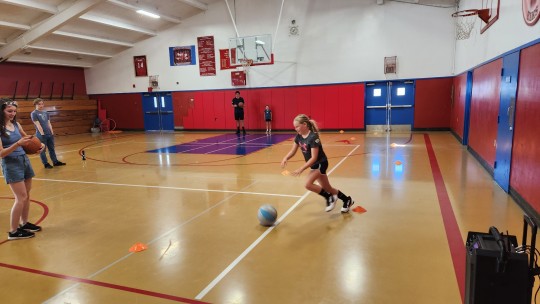


We didn't have a huge turnout at sports camp this morning - 6 kids. But it was so cool watching our team interact with them. We said from the beginning that God will bring who He brings and that it doesn't matter how many or how few show up. Those 6 kids had such a great time and were treated so well!
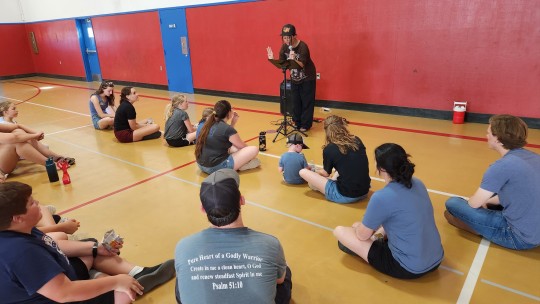
I also have to give a major shout out to Eva. She taught the Sports Camp lesson today and did a fabulous job. Eva's mom teaches Sunday School at PVCC and it's obvious that the apple doesn't fall far from the tree. She is a gifted teacher. She was engaging, clear, and energetic.
For those that have been praying, one of the girls at camp was on the golf cart last night. Then two of the other girls showed up at BARF Night tonight with her! Please keep praying for them, there were some great interactions.
After Sports Camp we ended up eating lunch at the local restaurant and it did not disappoint! The workers there had heard we were in town and said they were expecting us! The service and food was outstanding. We even saw one of the girls there from sports camp with her family and her grandma paid for a portion of our meal. How cool is that!?!?

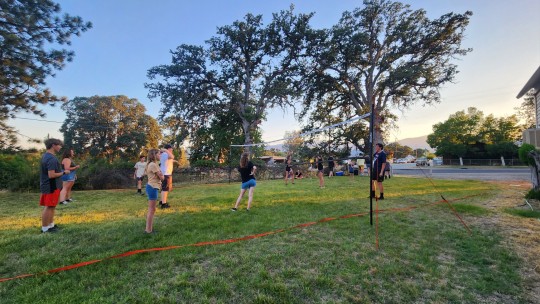

At BARF Night, we played Nuke 'Em much of the time with Bear Ninja Hunter and The Captain is Coming mixed in. I think there were 10 locals here with our group and we all had a great time. By the end of the night, everyone seemed like they'd been friends for years. It was pretty sweet.
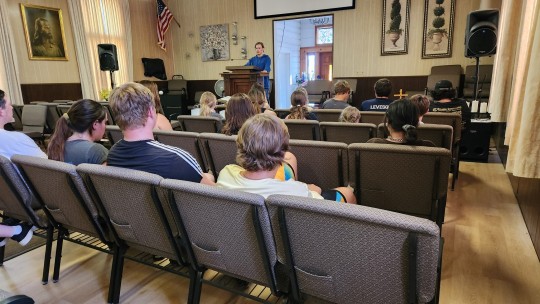
Andrew shared his testimony first and let me tell ya - he preached it! He shared how God drew him in over the past couple years through some circumstances that caused him to just decide to start coming to church. We are so glad he did!!
Andrew was a great example of sharing your story while also sharing the gospel. He was clear in his presentation and also told everyone here that he hopes they can have a relationship with Jesus too. Thanks a lot Andrew, great job! I also loved that when he went up to share he went straight to the pulpit!

Ellie also was a great example of sharing very personally about how God drew her closer to Him through some difficulty. She was diagnosed with a rare type of juvenile arthritis almost two years ago and told everyone that it caused her to rely on God more. He has been with her every step of the way. As difficult as it has been on her, she said that she doesn't know if her relationship with God would be as strong as it is if she wasn't going through this. That's a powerful thing to say!
I watched some of the locals listening to the testimonies and it is obvious that they are connecting with them. Please pray that this will lead to great conversations and that people would receive the gospel message!
Thanks for praying for the golf cart girls, there is one that was with them that didn't make it tonight. There's also another dude that drove his truck around with another girl tonight. They drove past and waved a bunch of times and everyone knew who they were. Pray that they'll come hang out with us too! Honestly, it seems like if these remaining three come to our events then that would mean pretty much everyone in town would be here!
Serenity went out of town today. She's going to a Christian Camp and might be back in time to come to BARF Night on Friday. There are some other youth that live around here that are also out of town.

I fell like we've really made some great connections in a short period of time. Please keep praying. God is good!!!
5 notes
·
View notes
Text
So I binge watched all 5 seasons of The Good Doctor in 10 days while recovering from tonsillectomy. Hooo boy it was a ride. I really love this show, sure it has some issues, but as a neurodivergent woman, I really really liked it. 🥰
I had seen first two seasons before, but watched them again. I love how Shaun and Lea's relationship progressed, how Shaun is always learning and evolving, how his relationships with his coworkers have blossomed. Oh and I loved almost all the medical stories. This is gonna be kind of like word vomit, sorry, but gotta get my thoughts out.
Season 1 is a classic, introduction to characters and the world, ending with Dr Glassman getting a really bad diagnosis, but Shaun pushing himself to find if it's the right one and saving him in the process. Also all the things with Lea. Hate Dr Melendez and Dr Andrews. Love Dr Kalu and Dr Browne. Shaun had a really bad childhood and it makes me so sad 😐 But also pretty relatable?
Season 2 intoduces Dr Lim, Dr Reznick, Dr Park and Dr Han. It's kind of heavier season? Dr Kalu has to leave, Dr Han is a fucking PRICK🙂 and I am glad Dr Andrews came to his fucking senses and protected Shaun. People are still questioning if Shaun should be working there during this season and it's.. sad.
Lea and Shaun become roommates, OMG they were roommates!!😳😳 I don't like Dr Reznick, she kinda reminds me of Haley from Stardew Valley. Dr Lim and Park are really nice. Melendez and Lim become a couple and it's SO CUTE! I love Claire's support for Shaun. ❤️ It was heartbreaking to find out about Dr Glassman's daughter though 😭
Season 3.. it's really good. Might be my favourite season so far? We see Shaun pursuing a relationship with Carly, getting closer and more comfortable with eachother. Eventually they break up and Shaun tries to tell Lea how he loves her, but she has insecurities and doesnt want a relationship. Shaun struggles with losing both Carly and Lea 🥺 Claire struggles a lot this season, Im glad that Lim and Melendez are helping. Reznick being diagnosed with rheumatoid arthritis is very fucking sad. She is SO driven to be a surgeon, but she probably has to give it up.
But my favourite part was probably the two-parter season finale. THE ENDING DESTROYED ME 😭😭😭😭😭😭 Melendez dying came out of NOWHERE, I was so hoping for a magical last minute cure which never came... I really loved Melendez this season and how he helped Claire. Also this taught me how you should never ignore "small" injuries, it's not worth to die for. They could've had the romance of the century 😭❤️
I am really glad the ending helped Lea realize how much she loves Shaun. Also Dr Park with that boy stuck under a bar that fell during the earthquake, slowly dying.. LET'S JUST SAY THERE WERE A LOT OF TEARS THIS SEASON 🥲🥲🥲
Season 4 starts with coronavirus two-parter opening. It's super sad and I am actually kinda surprised, that only Dr Lim ended up with PTSD. This season introduces us to new residents that Reznick, Park, Shaun, Claire, Lim and Andrews have to teach. Loved Olivia, but I was sure she was gonna quit. The other guy didn't really resonate with me, but it made me sad how they kinda made fun of polyamory. Dr Allen.. she's nice, but I don't really like overly religious people. Dr Asher Wolke, however, is my FAVOURITE?! after Shaun and Claire and Melendez? His story really resonated with me, him leaving his family and religion to be himself. Oh and it was so sad when he lost his freaking FIRST PATIENT?? 😭😭😭😭😭😭😭 Him continueing CPR even though he knew it was futale.... Made me cry so hard.
Dr Reznick giving up surgery was really sad, I felt for her so much.
Meanwhile, Lea and Shaun's relationship is blossoming and turns out Lea is pregnant! I'm glad they showed us the option to abort. I kinda spoiled myself though 💀 Was scrolling through episodes list and saw about grief and well, that happened, they lost the baby. I don't EVER want kids myself, but they portrayed the loss very well and I felt a lot of empathy for both Lea and Shaun.
I really loved the season finale two-parter in Guatemala. To see how life is there, how privileged I am to have FREE healthcare. I knew Lim and that guy were going to get together, but I didn't really like it. I really liked how Lea at first refused to hold that woman's baby but then did and also helped all night. I think that really helped her deal with grief. Park and Reznick getting together was.. surprising but I like it? CLAIRE LEAVING WAS SAD :( We lost Melendez last season and well, at least Claire didn't DIE, but it was sad to see her go, especially since she is Shaun's best friend. Lea proposing was very surprising but nice!!
Season 5, final season for now, I didn't actually like THAT much? Maybe like 2nd best from the bottom. I hated, that The BITCH Salen posed as a PATIENT with ADHD and then turned out to be buyer of the hospital. I hated her guts, so much. Also hated Reznick and Andrews for a while, but at least they made up for their mistakes. First half of the season was just stressing me the hell out. Also Lea and Shaun fighting 😐 and having trouble deciding on the wedding. The Shaun Show and The Lea Show were very nice episodes ❤️ I am glad they finally married in the final episode, they teased us so much!
AND I AM FREAKING OUT ABOUT DR LIM AND THAT NURSE, GUYS PLS DON'T BE DEAD, YOU CAN'T DO THAT TO ME AFTER MELENDEZ WHICH I AM STILL NOT OVER WITH!!
That was a lot, you're a hero if you read this far, thank you! ❤️ I can't wait for the next season to break and mend my heart even more🥰❤️
#the good doctor#the good doctor spoilers#the good doctor season 5#the good doctor season 4#the good doctor season 3#the good doctor season 2#the good doctor season 1#essay#the good doctor essay#shaun murphy#lea dilallo#aaron glassman#morgan reznick#claire brown#neil melendez#marcus andrews#alex park#asher wolke#jordan allen
25 notes
·
View notes
Text
Anti-inflammatory diet.
Hey there, friends! Let's talk about something that could really make a difference in how you feel: adopting an anti-inflammatory diet. 🥦🍓🥑 It's not just a fad; there's solid science behind it that could benefit your health in numerous ways. Here's the scoop:
🥗 Key Takeaway 1: Reduce Inflammation, Feel Amazing "Chronic inflammation is at the root of many diseases, including heart disease, diabetes, and arthritis," says Dr. Frank Hu, Professor of Nutrition and Epidemiology at Harvard T.H. Chan School of Public Health. By choosing foods that fight inflammation, you can help reduce your risk of these conditions and feel better overall.
🍎 Key Takeaway 2: Load Up on Antioxidants "Antioxidants found in fruits and vegetables have been shown to combat inflammation by neutralizing free radicals in the body," explains Dr. Barry Sears, a leading authority on anti-inflammatory nutrition. So fill your plate with colorful produce to give your body the ammunition it needs to fight inflammation naturally.
🐟 Key Takeaway 3: Embrace Healthy Fats "Omega-3 fatty acids, found in fatty fish like salmon, as well as nuts and seeds, have powerful anti-inflammatory properties," says Dr. Walter Willett, Professor of Epidemiology and Nutrition at Harvard T.H. Chan School of Public Health. Including these healthy fats in your diet can help quell inflammation and support overall health.
🥕 Key Takeaway 4: Say No to Processed Junk "Processed foods high in sugar, refined grains, and unhealthy fats can promote inflammation in the body," warns Dr. Andrew Weil, founder and director of the Arizona Center for Integrative Medicine. Steering clear of these inflammatory culprits can go a long way in reducing inflammation and improving your health.
🥦 Key Takeaway 5: It's a Lifestyle, Not a Diet "An anti-inflammatory diet isn't just about what you eat; it's also about how you live," says Dr. David Katz, Director of the Yale University Prevention Research Center. Getting regular exercise, managing stress, and getting enough sleep are all important components of an anti-inflammatory lifestyle.
So there you have it, friends. By making simple yet powerful changes to your diet and lifestyle, you can tame inflammation and set yourself on the path to better health and vitality. Let's eat well, live well, and feel amazing together! 🌟 #AntiInflammatoryDiet #HealthyLiving
1 note
·
View note
Text
This clip gives me Ashley and Andrew vibes.
#the coffin of andy and leyley#tcoaal#ashley graves#andrew graves#andrew x ashley#ashley x andrew#coffincest#gravecest#andy and leyley#source: cold ones
0 notes
Text
An Introduction to Arthritis of the Hip and Knee by Andrew Dold MD - Orthopedic Surgeon
Dr. Andrew Dold, MD, c surgeon, and hip and knee specialist, gives a brief introduction and description of osteoarthritis of the hip and knee. This includes a discussion of some of the conservative and surgical treatment options. Osteoarthritis (OA) is the most common form of arthritis. Some people call it degenerative joint disease or “wear and tear” arthritis. It occurs most frequently in the hands, hips, and knees. With OA, the cartilage within a joint begins to break down and the underlying bone begins to change, resulting in pain and other symptoms including instability, weakness, and mechanical symptoms. There are a number of important treatment options to consider prior to surgery. For more information, please visit www.DoldMD.com.
1 note
·
View note
Text
imo most fanfic and the bonus content dont give andrew minyard enough credit when they envision what he would be like in middle age. dude could have kids i can imagine it. he would be such a strange serious short 45 year old man like outside of the context of exy you would look at him and say ah here is a scandinavian. i think in his thirties he wore a lot of body glitter and was an addict. here are some hobbies i think he could feasibly pick up in his middle age:
growing bonsai
birdwatching (not birding but hes like a dedicated bird feeder/duck pond guy)
coaching a little league exy team (probably requires him to have at least 1 kid already but again i can imagine that)
some kind of manual boating like canoeing or sailing dependent on location. i think he would sail on a great lake or the ocean but not on relatively small inland lakes. but he would canoe like i think he could get into portage camping depending on how ye old cptsd chronic illness situation sets in. arthritis?? or maybe he portages when hes younger. with robin who in my mind grows up to be like a crazy skilled backwoods traveler
anyway
showing cats. LOL
alternatively, fostering cats
bicycling in one of those like incredibly long packs of men on bikes wearing aerodynamic clothing
and so on and so forth
Like the point is everything changes beyond absolute recognition. and. the people writing about andrews life post college are all young lol
#robin andrew camping trip is just like a zuko field trip#character meta#much belated edit: my friend says i missed WOODWORKING. DUH
1 note
·
View note
Photo
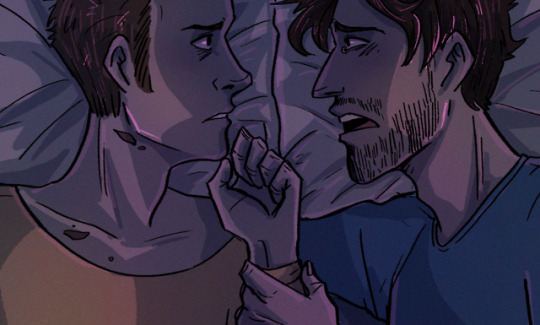
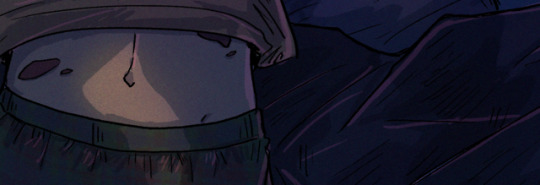
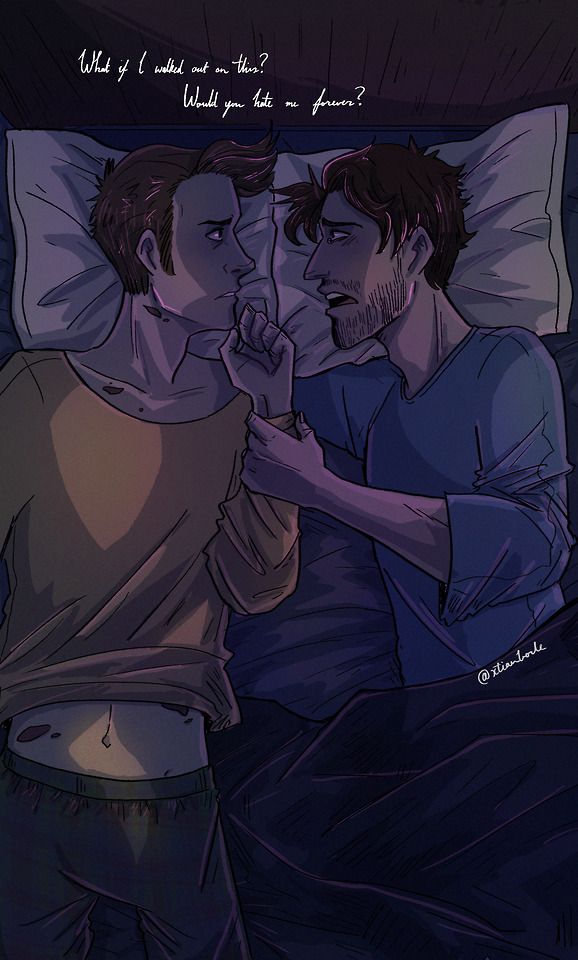
“... Yes.”
art trade with @chicken-vindaloo !!
(do not repost/remove caption/tag as kin)
#angels in america#andrew garfield#prior walter#louis ironson#broadway#my art#GOD that took a minute and a half#i finally figured out how to use my tablet without completely giving myself arthritis#if ur not following charlie already wtf r u doing git on it!!
169 notes
·
View notes
Text
Out of sight: how Flowers in the Attic mirrored its author’s captivity
When VC Andrews’s debut novel, Flowers in the Attic, was published in 1979, it was not well received by all critics: one described it as “possibly the worst book I have ever read”.
However, her gothic horror-romance about four children who are locked in an attic for three years by their beautiful, conniving mother – who seems loving but actually starves and poisons them – went on to sell more than 40 million copies, was on the New York Times bestseller list for 14 weeks and is still in print more than 40 years later.
Now, startling parallels between the lives of the children imprisoned in the attic and Virginia Andrews’s own life as a severely disabled woman are to be laid bare for the first time in a forthcoming biography, The Woman Beyond the Attic.
The book claims that when Andrews – who spent most of her adult life housebound in a wheelchair – was disobedient, her “controlling” mother would imprison her in her bedroom and deprive her of a meal as a punishment.
“Her mother would lock her in her room and not give her dinner, if she got angry at her,” said Andrew Neiderman, author of the new biography, which will be published on Thursday. “She controlled who Virginia could see, what she could do and punished her for not doing what she wanted.”
Andrews suffered from rheumatoid arthritis but lived a relatively independent life before a surgical treatment in her late teens left her unable to walk and move her neck without pain. By the time Flowers in the Attic was published, Andrews was 56 and had been dependent on her mother, Lillian, for decades.
“She was trapped,” said Neiderman. Like the children in Flowers in the Attic, “her mother kept her under lock and key. Firstly, because she was ashamed of her for being disabled, and secondly, because she couldn’t handle it [Andrews’s disability].”
Andrews always maintained that the plot of Flowers in the Attic was “a fictionalised version of a true story” that a hospital doctor had told her when she was a teenager. But as an isolated disabled woman, reliant on her mother’s care, “she felt so trapped by her illness – and was so incarcerated by her mother sometimes – that she could understand how children would feel locked up in an attic,” believes Neiderman.
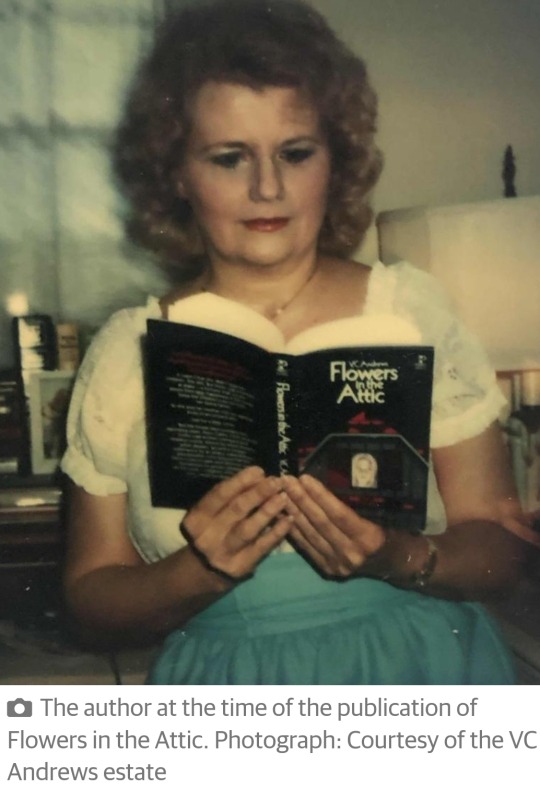
#VC Andrews#Virginia Andrews#The Woman Beyond The Attic#Flowers In The Attic#Biography books#Fiction books#Books#Disability#Culture#Pop culture#Society#Things you never knew about authors you loved
510 notes
·
View notes
Text
Death of Heroes
Because not even Neil can outrun the ephemerality of men.
Renee is the first one to go.
Nearing sixty but never reaching it, she is outlived by Abby and Wymack. At least Stephanie Walker is waiting for her at the gates of Heaven, but for the rest of her Foxes, the loss is heavy.
It’s cancer. Leukemia.
It started with the bruises from her sparring matches with Andrew not healing very well. Then not at all. After decades of maintaining these monthly meetings, of keeping her body healthy, Renee finally has to give it up. She knows something is wrong, and she knows that these sessions won’t be of any help, now.
Then the extreme fatigue starts. Still, Renee doesn’t do a thing about it. Or at least, she lets life go its own course. She looses weight, which she already doesn’t have much of. But then the nosebleeds begin, and it’s no use telling Allison to stop worrying. The diagnosis is unsurprising, yet still shattering. And it’s not a good prognosis either, but it’s still not bad enough for the doctor to give up the Five-Year survival plan.
Renee has to speak up. Ally, I don’t want to do this. She has to put her foot down. Allison, my love, it’ll be okay. I won’t get better, you and I both know that. But it can be okay. It can still be good.
Renee doesn’t get treatment. Renee doesn’t tell anybody, except Andrew. Because Andrew knows, somehow, that she made a terrible, irreversible choice. Because Andrew only deals in truths. Because Andrew is Andrew, and just as he needed her all those years ago, she needs him now.
A little more than six months pass, with less and less outings from Renee and more and more excuses from Allison, and Renee gets sick. Really sick. It starts like a regular cold. Then it looks more like the flu. And suddenly it’s pneumonia, and respiratory difficulties, and lung failure. She’s in that hospital bed, wearing that gown, breathing in that mask. Renee finally nods to Allison, giving her consent.
Ally makes the call.
Only Andrew and Dan make it in time.
Renee Walker goes out like a light.
The Foxes, who had once upon a time been used to murders, life-threatening schemes and acts of extreme violence, had never really known Death itself. The simple, yet inevitable fate of human lives. Of going quietly into the night. It’s all so quiet. So anticlimactic. It’s so quiet, too quiet, too heavy with silence. This time, there is no one to blame, no one to punish, no one to take responsibility.
It’s just life. It’s just death.
Wymack and Abby can’t believe that one of their Foxes, on of their kids, left before them. Renee’s Korean roots made her look barely a day over forty, which made it all so much worse. Renee’s death takes a toll on every single one of them. Because it’s Renee, the best of them. Because all her papers are in orders, her will to date, her wishes known; just as when she was alive, she leaves no chaos behind her.
There is nothing and no one to be mad at, except life.
In the cemetery where Stephanie Walker is buried, Andrew buys a large lot of land. (Large enough to one day welcome all the Foxes) The tomb is moved over there, and Renee’s name is added. A tree is planted above her scattered ashes. It’s very small, very fragile, but with the years, it grows strong.
For the first time, the Foxes realize that, despite going through Hell and back in their youth, they are not immortal. There is nothing to be done about that, but it hurts. It hurts to lose their angel this way, so soon, so suddenly. It hurts to lose, period. It feels like a failure, like giving up. They lost her. They lost.
But somehow, they gained something else they might never know about. Renee might have been the only religious one among them, but that didn’t stop her from becoming their Guardian Angel. Because somehow, from then on, the Foxes were spared.
Let me show you.
Just as Bee had a few years before Renee, Abby, then Wymack, simply die in their sleep, no fight, no agony. None of them have to see another Fox go before them. They don’t have to go through that indescribable ordeal ever again. They are spared the pain.
Then decades pass, enough for the remaining Foxes to grow very old, and live very long. Not infinitely, but long enough.
Matt is the next one to go.
Matt has worked hard all his life, both mentally and physically. It comes to no surprise, then, that arthritis chose to invade his body. For the first few years living with the diagnosis, natural medicine and osteopathy are enough to keep the pain at bay. It doesn’t stop Matt from doing anything. He babysits his 9 grandchildren with Dan every week; he goes on roadtrips with Dan every summer; he goes on a light jog with Dan every day.
It’s just that one day, it’s not enough anymore. Slowly, almost imperceptibly, the pain becomes too much for Matt to do his day-to-day activities. And really, the pain, he could take; it was an old friend, a familiar feeling, almost like a sixth sense.
It was the mental toll of it all that he couldn’t take. To have to say no to seeing his grandchildren. No to driving around endlessly and aimlessly for hours. No to waking up in sync with Dan every morning, and no to their routine, and no, and no, and just- not living.
For the first time in a long time, Matt doesn’t want to do this anymore.
But he does, still. He smiles, and he lies, and he tries to will away the pain.
It all comes down to one afternoon, when he takes his painful walk of the day around the neighborhood. There are three little kids playing Exy in their driveway, when suddenly a ball escapes their racquets and rolls down in the street. The smallest kid runs after it, runs and runs and runs, without looking. Kind of like Neil, Matt thinks to himself before his body acts of his own. The kid doesn’t see the car, and the car doesn’t see the kid. Matt sees both.
The BMW is going way over the limit, its sleek black sides reflecting the sun too brightly. Despite his pain, despite his age, despite his now slow reflexes, Matt leaps. He screams at the kid to stop and turn around, to let the ball roll away, but to no avail.
Matt pushes the kid away in time for the car to hit him instead, and only him.
The rest becomes a blur, but the final verdict is as such: broken hip, shattered leg, probably won’t walk ever again, even with surgery. The doctors and surgeons warn Matt that with his age, his pre-existing condition, and his drug history, surgery might kill him. But Matt refuses to be bedridden for the rest of his already miserable life. Dan knows that. She knows that he has to try. Knows that he might not pull through. She also knows that Matt wants to go, has wanted to for a while now.
She calls Neil. She calls Allison. From there, all the Foxes are bound to get the news. Matt promises to wait until their arrival before going into surgery. In the meantime, the nurses start a morphine line, after warning the couple very strongly about the side effects and the risks. But Matt is in pain, terrible pain, and it’s a compromise to wait for his Foxes. It takes about a week for all of them to come to his bedside, with Nicky being last, coming all the way from Germany. Neil and Allison barely leave his room; Dan doesn’t at all. The others take turns, leaving as much space for Matt’s kids and grandkids as their hearts can allow.
The open spot for Matt’s surgery is on a Friday.
Matt Boyd does not make it to Friday.
The morphine is too heavy on his heart. It was a possible outcome, not as alarming as the upcoming surgery, but... Matt had secretely wished to go ever since and- maybe, up there in Heaven, someone heard him...
Dan and Matt had had a mutual understanding, that it was okay, but it doesn’t make it any more easy to let go.
Two months into Matt’s departure, Allison moves in with Dan. She walks her through every stage of grief. She grieves all over again herself, too. But they make it.
Same goes for Andrew with Neil. Neil doesn’t know loss like this. Death like this.
And yet. And yet. Deep, deep down, Neil is scared. That after all his years of running, and fighting, and lying, he won’t get that peaceful ending Matt was granted.
But Neil lives.
And Nicky leaves.
A few months after Matt, he and Erik simply stay in the States. They say it’s because they want to be close, because they don’t want to miss anything, because they don’t want to risk a Fox leaving without a chance at saying goodbye. Because Nicky misses his Aaron and his Andrew.
Which are all valid and true motives. It’s just not the whole truth.
Nicky has dementia. Alzheimer’s, to be precise. Diagnosed about a year ago. It’s not bad yet, but- It’s the endless back-and-forth between the house and “der Supermarkt” because Nicky forgot what he drove there for in the first place. It’s forgetting words in all the languages Nicky speaks. It’s freaking out at all the Germans speaking German, because Nicky sometimes believe he is still living in America. It’s not finding the Columbia house and panicking when Nicky can’t get a hold of Andrew or Aaron.
It’s hard, it’s heartbreaking, it’s terrifying, but it’s manageable.
Once Nicky and Erik settle back down in North Carolina, they both wonder how long it’ll take before the twins figure it out, because there is no way Nicky is telling them, but he also knows nothing can get past his twins.
And he’s right. Between Aaron’s acute knowledge of Medicine and Andrew’s reknown lie-detector skills, it takes about 14 days for them to take Nicky hostage and demand the truth.
As the year comes to an end, Nicky’s dementia doesn’t seem to progress that much. He seems to escape the worst. He doesn’t forget anyone. He doesn’t become aggressive, doesn’t go missing, doesn’t lose any function of his body. Without looking too closely, Nicky is simply getting old.
The twin girls he and Erik adopted get to move back in for a little while, having lived in the U.S. all their lives and seeing their parents fly to Germany after their retirement. They know, too, and try to make the most of it. They are lucky. They are so lucky. Nicky is a miracle patient.
In the end, though, it’s Nicky’s body rather than his mind that gives out. Once you reach a certain point in time living with the disease, but without the general complications of it, eventually the brain has trouble managing all the organs of the body. So instead of forgetting to eat, or forgetting names and faces, sometimes your brain doesn’t remember how to make your heart beat. Or how to make make your lungs breathe.
Nicky Hemmick stops breathing in the middle of the night, after having wished his twin daughters goodnight, texted his other set of twins goodnight, and kissed his husband goodnight. Nicky had thought, then, that it was indeed, a good night.
Just as he had remembered his Foxes until the end, he was remembered by them as the big-hearted lover that Heaven had just gained as its new angel.
Too soon after him, though, it’s Allison’s turn.
It’s not that she’d simply been waiting around for the day she could be reunited with Renee. She just didn’t understand why her Foxes kept leaving, and why she was still stuck here without her other half.
She didn’t just wait, though. She helps Dan out with the grandkids, and sometimes the grown-up kids too. She volunteers a lot. She gives back to the Columbia community, and all around the world. She travels to places she’s never been, places that remind her of Renee, but are void of painful memories. She empties their bucket list, and much more. The last thing Allison has yet to do, the only thing left to do, is mending her relationship with her parents. Or parent. Singular. In spite of everything, including the death of her husband, Francesca Reynolds was still standing strong at the head of the Reynolds empire. 100 years old was nothing when you lived in spite.
In a twisted way, Allison believed that maybe her mother was the last piece she needed to mend before she was allowed to go. That despite being gone for years, Renee was still there somewhere, looking out for her and making sure she didn’t have any regrets.
So Allison accomplished the unthinkable, the unimaginable, the impossible. For the first time in decades, she flew back to the Reynolds estate and spoke to her mother. In person.
It was not the emotional reunion Renee might have hoped for, but it was a reunion still. That was more than enough for Allison. They didn’t talk about the big things. The important things. But they talked. They talked. And they scheduled another talk.
Back home with Dan, Allison embraced her friend and let the tears fall. She was grateful for her friend, but both of them knew that these were not the arms Allison wished to be held in. She went to rest a bit before dinner, and she tried to imagine how it would feel like to have Renee hold her again.
For someone as loud, as present and as strong as she was, Allison Walker slipped quietly from time.
When Dan found her, she could only smile tearfully. She played with her hair one last time as she called her Foxes.
Allison left Dan in charge of her finances, and so she took over her charity duties and went above and beyond to honor her friend’s memory. Her sister.
Dan thought she would be next. She wished, she hoped, she prayed to be next.
She wasn’t.
Kevin was.
He might have been the biggest and hardest loss to weather. It wasn’t a feeling that could be explained. As painful as it had been to lose Renee, and Matt, and Nicky, and Allison, losing Kevin was... the great and terrible 10, as they’d say.
Kevin should have died way sooner. His liver should have given out because of all the alcohol it had endured in Kevin’s youth. His heart should have given out because of all the stress it had faced for most of Kevin’s life. All the bad things that could happen with old age should have happened to Kevin, but they didn’t. They didn’t.
Death came knocking one day, and politely asked him if he would please follow them, and Kevin simply took it as a sign that his time was up.
That day, Kevin had felt a numbing pain in his chest all morning long. Used to little injuries here and there, he hadn’t thought anything of it. And he certainly wasn’t about to worry his doctor of a husband...
However, as the sun reached it’s highest in the sky, Kevin couldn’t really hide his pain any longer. He had lain down on their couch for a bit, but he couldn’t seem to get back up. It was too exhausting. So he called for Aaron, as loud as he could in the state he was.
As Aaron stumbled into the living room, Kevin tried to use his softest voice to inform his husband of the situation. Aaron immediately called an ambulance, and when the vehicle took them both away, he reached for his phone again to make, once again, a terrible call to their Foxes. But through his oxygen mask, Kevin reached out to grap his wrist and whispered, with difficulty, just Neil... just Andrew...
Because here’s the thing: Kevin loved his Foxes, and his Foxes loved him back. Immensely.
He loved them so much he had married one, with another one of them as best man (Neil), another as his husband’s (Andrew), and yet another one as their celebrant (Renee).
They loved him so much that it was only short of worship by a hair or two. And Kevin knew that. He loved Dan like a sister. And by extension, he loved Erik like a brother, too. And he loved all the Foxes’ children and grandchildren like his own, despite never being a parent himself.
But Neil and Andrew... There were no words for what they were to him. He knew that he wouldn’t have to talk them through it. He knew they would be the only ones strong enough and close enough to hold Aaron up in case it all turned to shit the moment he passed the hospital doors.
And being the History nerd he had always been, Kevin had written letters, a long time ago. To his Foxes. Most of them had left before him, and so he could never give them their letters, but Dan, and Erik for Nicky, could still have those letters. Kevin poured everything into these letters. It had taken him years, ever since Renee’s departure. He wrote, and threw away, and started again, until he got it right. Nine letters, for his nine Foxes. Andrew knew about it. He’d give Nicky’s and the upperclassmen’s to Dan and Erik, and they’d understand. Kevin didn’t want them to be there, at the very end of it all. He just wanted Aaron. And Neil. And Andrew.
Those three had letters waiting for them, too. Andrew would hand them over a month later. But he would never open his.
Andrew and Neil arrived just before 1 PM. Kevin was hooked on all sorts of IVs and still had the oxygen mask on. His heart monitor was beeping very, very slowly, erratically. He was still Kevin Day in all his gloriousness, but he was much more Kevin, their beloved Kevin.
On one side of the hospital bed, Aaron never let go of Kevin’s hand. On the other side, Kevin removed the mask and weakly motioned for Neil to take the other hand. But Neil was stunned. Frozen. So Andrew came up behind him, and held Kevin’s hand.
It would be the first, and the last time.
Just as Neil finally sprung into action and went to put a hand on Kevin’s shoulder, feeling his wiry muscles and his fragile bones underneath the hospital gown, Kevin closed his eyes.
The heart monitor began flatlining.
Neil looked at the monitor, then to Kevin. He looked at Andrew, then back at Kevin, and then at Aaron. His eyes couldn’t stay focused on one thing. He was still hoping. He was still refusing.
Aaron lowered his head. Kissed Kevin’s hand.
Andrew held on tighter to Kevin’s other hand. Gripped the back of Neil’s neck.
Kevin took Death’s hand, which felt a lot like Aaron’s, and Andrew’s, and Renee’s, and walked away.
Aaron unplugged the monitor. And called it.
Time of death: 13:01.
It took exaclty one month, day for day, for Aaron to leave as well. They called it the Broken Heart Syndrome. On the surface, Aaron had held it together. But Andrew knew. He saw. That he was losing him as well.
Some could say that, by handing over Kevin’s letter, Andrew killed his brother. But those who would say that didn’t even begin to understand the complexity of the bond between twin brothers. Especially not the Minyards.
Because what Andrew really did, with that letter, was gifting Aaron with relief.
Peace. Quiet.
Love.
Aaron could exhale, now. He would see Kevin soon, now.
And so in the same room, in the same bed as his husband’s, Aaron Minyard forced Death’s hand and demanded to see Kevin again.
And then there were three.
Dan lived for so long that she started to fear outliving her children. She felt old, so old. In her head and in her heart. She did not believe in a God, but she often found herself praying to someone, anyone. She did not believe in angels and demons, but she often wondered how long they would keep her from Death.
So she waited. For the days to go and the nights to pass. She barely ate anymore. She barely moved. She was only feeling okay when she slept outside, in her chair in the backyard, the sun shinning on her beautiful face. She could sleep for hours there, surrounded by her lively garden. The wind swayed her skirts, the trees whispered in her ears. It was okay.
And at the same time, it wasn’t.
She was tired. She was lonely. Even Erik, a couple of years ago, had gone to rejoin his husband. Neil visited her at least once a week, but he still had Andrew. He couldn’t understand, nor could he stay away from him for too long. He would miss him too much.
Every year she celebrated another birthday, and every year she blew her candles wishing they were her last.
And at last, her wish came true.
Dan was expecting one of her kids to come by in the afternoon. The Carolina sun was shinning quite hard on her, so she had placed her chair in way that let the sunlight hit the back of her head, turned away completely from her house. Her daughter knew exactly where to find her when she arrived, and so she didn’t wait for a response to her presence before making her way down into the garden. She had called her mother multiple times, and had assumed she was sleeping when she hadn’t answered.
Dan was not sleeping.
Dan Wilds had left this world, the sunlight pouring down on her like the radiant goddess that she was.
Being one of the last Foxes, it took a day before Neil and Andrew got the news of her death. They don’t get involved in the funeral preparations, but they show up. And that’s enough.
People don’t really bother them anymore, so they can bid farewell to their Captain in relative peace. They come by Dan’s house aftwerwards, too, and help her kids out with everything. Yes, even Andrew.
Dan’s death makes them reflect the most.
About the Foxes. About each of their departures. How they all lived a good and long life. How they all died a good and quiet death.
They think about how they were always the ones nearing death, always fighting to stay alive. About how they died a million deaths before the age of 18.
They think about how they are the last ones standing, even after everything.
They survived. They lived.
(They loved)
Neil and Andrew should not have gotten this far. They should not have lived this long. They shouldn’t have. But somehow, somewhere above, someone has watched over them and made sure that they didn’t get the ending they should’ve had, but the ending they deserved.
Neil and Andrew don’t really want to die. They don’t really want to live on either. But they take every day that they are given, to be with each other, to mend their hearts still, to breathe.
They take every breath they can.
They wonder who will leave first. Who will have to say goodbye and stay behind, who will have to wait.
It’s a fear neither of them had ever thought they’d have. Not like that.
And it’s only a matter of time before they get their answer. They are, after all, getting very old. It is both a blessing and a curse.
After decades of partnership, Neil and Andrew still go to bed the same way they did when they were eighteen. Both facing each other, their hands joined in the middle, their nose a breath apart.
After decades of peace, Neil and Andrew still wake from sleep at the slightest abnormality.
Which is why the minute Neil Josten gives out his last breath, Andrew awakes.
Neil’s hand in his is still warm and his skin is still soft. His hair, although completely white for quite some years now, still have that bronze glow to them. They’re still curly, and soft to the touch. Andrew passes a hand through them before resting it on the back of Neil’s neck.
He looks at Neil like it’s the first time, tries to memorize every detail of his beautiful face. He rubs circle in his skin, and takes in everything that was, that is Neil. His husband. His junkie. His rabbit. His pipedream. His lover. His love.
Andrew doesn’t move from their bed.
When he has finally spoken everything that he feels to Neil, from the safety of his mind, Andrew moves closer to him so their foreheads touch and noses align. He takes Neil’s lifeless hand again, and kisses it. He sets their hands back down, between the two of them, and looks at Neil one last time.
And slowly, Andrew Minyard closes his eyes, forever.
#all for the game#andrew minyard#neil josten#aaron minyard#kevin day#renee walker#allison reynolds#dan wilds#matt boyd#nicky hemmick#erik klose#aftg#aftg fic#tfc#trk#tkm#the foxhole court#the raven king#the king's men#andreil#kevaaron#renison#danmatt#dan x matt#nicky x erik#death of heroes#major character death#david wymack#betsy dobson#abby winfield
466 notes
·
View notes
Text
Just some food for thought via Andrew Hickey, who also happens to be the writer/music historian responsible for A History of Rock Music in 500 Songs, one of the only podcasts I can stand to listen to:
The thing that clued me in to Elvis’ neurodivergence, that unlocked this for me, was Sam Phillips talking about signing Elvis. Phillips is often quoted as having wanted “a white man who can sing like a Black man”, but when you listen to the earliest recordings of Elvis, there’s no sensible way anyone could have thought of him that way. What Phillips *actually* said was that “his insecurity was so markedly like that of a Black person.” In particular, in the South at that point, Black people didn’t look white people in the eye. Nor did Elvis.
Both Phillips and Carl Perkins said that Elvis was the most introverted person ever to enter a recording studio, in more or less those exact words.
As a young man, Elvis had very few real friends. He was extremely close to his parents, especially his mother, with whom he almost had a private language and could communicate in a way he couldn’t with anyone else, but had difficulty making friends his own age. He would often hang out with people like Johnny and Dorsey Burnette, who lived nearby. They would bully him, but they’d let him stand on the edge of the group and sing when they were singing.
Later in life, Elvis would surround himself with the “Memphis Mafia”, a group of people to whom he was intensely loyal, even though they were mostly taking advantage of him.
Elvis was known for being constantly in movement, fingers twitching and legs tapping all the time.
He was extremely poor at emotional regulation, and could swing wildly in mood.
He was a very naturally talented actor, who could lose himself in a role (though he was never given the chance to grow).
Before becoming a singer, he worked for a time as an electrician, but he was very bad at it. He kept giving himself electric shocks, and once said it was a miracle none of the houses he worked on had burned down.
He was very into martial arts, which he liked because it allowed him a sense of control over his body.
Some of his stage costumes in the seventies were patterned on his favourite comic-book character, Captain Marvel Jr.
He was a voracious reader and would bring three trunks filled with books on tour with him.
His famous hip-shaking actually started as nerves — he was trembling the first time he was on stage, and it made his baggy trouser legs shake, which the audience took as intentional.
He watched Monty Python and the Holy Grail thirty-five times, and could quote it from memory. He was also a particular fan of Peter Sellers.
He had a highly restricted diet, and had specific issues with textures — food had to be prepared a particular way, with bacon almost burned and eggs hard, and he would eat particular combinations of food many other people found disgusting. People to this day mock him for his taste for peanut-butter, bacon, and banana sandwiches.
He had real problems with sleeping — he was naturally nocturnal, and often had to rely on medical help to get onto a somewhat-diurnal schedule. Even with pharmaceutical help he rarely slept more than three hours at a time.
He had bad skin — the thing people note most about him as a young man was that he had terrible acne on his neck.
He had a near-photographic memory, and would learn and retain a song after hearing it only once. He had an encyclopaedic knowledge of music.
And perhaps most importantly, for much of the last few years of his life he was chronically ill but didn’t present that way. The prescription drug use for which he became notorious after his death was a combination of things to treat his sleep problems, and pain medication. The thing that eventually killed him was not his lifestyle, as reported — he had a variety of genetic, stress-related, inflammatory and autoimmune conditions which made him put on weight, including the hypertension that led to his eventual heart attack. These seem to have been inherited from his mother (who also died in her forties). Again, it’s not a formal diagnostic criterion of autism that one has autoimmune problems, but anecdotally the *vast* majority of autistic people have them (there’s a reason the average life expectancy for an autistic person is fifty-four).
But the pain medication… Elvis told his doctors, for years, that he was in a huge amount of pain. They thought he was faking, because he didn’t “act like” someone in pain — they thought he was after drugs. So sometimes he was prescribed real opiates, but other times he would be given placebos, made to look like the drugs that worked. When those didn’t work, he took more of them, so when he got the real stuff he took more than he should, which made the doctors believe he was just after drugs…
After his death, when those same doctors re-examined X-rays of him, it was obvious he had arthritis, and had really been in unspeakable agony for years. But he’d just not seemed like he was in pain to the doctors. He didn’t act how a person in pain “should” act.
Again, nobody who isn’t neurodivergent will read the above and be convinced. But I think if you’ve any experience of the neurodivergent community, you’re going to read that, and come to the same conclusion as me.
107 notes
·
View notes
Note
TW: ab*se, t*rture, su!cide, mental il!ness, ab!eism
So, before I forget, we really need to discuss Scientology (quick note: if you're easily grossed out and/or are already terrified for Andy, I suggest not reading this).
Scientology. Not only is their whole 'religion' a scam to avoid paying taxes and the police coming after them for all the controversies surrounding them because of the religious freedom America grants in the Constitution, but their religion has been dumped on quite a few times because the founder of it, L. Ron Hubbard, is a science-fiction author. Their beliefs are that Xenu, the leader of the 'Galactic Confederacy', brought billions of people to Earth in a spacecraft, stacked them with volcanoes, and then blew them all up with hydrogen bombs. They also believe that humans are 'Thetans', immortal aliens who reincarnate into child's bodies (which is why they treat children like adults, they believe children are just adults in children's bodies) and live in one eternal lifetime. Sounds a little like something straight out of a science-fiction book, right?
But to stray away from the religious part of it, let's focus on the parts that make me sick:
1. Scientologists punish people if they question or talk back to them.
2. They cut people off from their social life, work, family, friends, etc. and engulf them in Scientology only and try to cut off any ties to the outside world.
3. They force women to have abortions while at sea because they believe that no child should be born at sea.
4. There have been many allegations of abuse against staff and members.
5. They enforce child labor and have many allegations of child abuse.
6. The Sea Org, a Scientology organization, makes people sign a billion year contract.
7. They're ableist and don't believe in psychology, doctors, medicine, mental health, etc. and force people to take vitamins in replacement of their prescribed medicines, which caused multiple suicides and murders.
8. They're extremely greedy. In fact, what they claim to be the 'Bridge to Freedom' that puts people 'in the Clear' is given through million-dollar books and classes, and when a person almost reaches the last level before they reveal the 'big secret', they claim that more works have been 'found' and that they must start the process all over again to pay thousands of dollars again.
9. They're homophobic. While they believe that mental illnesses like anxiety, depression, BPD, schizophrenia, etc. and even physical disorders like arthritis and the common cold are caused by a 'reactive mind' that causes 'ailments' and can be healed through saunas and sci-fi lessons, they also believe that homosexuality is also an 'ailment'.
10. The whole religion thing only started because the IRS came for them with billion-dollar debt and they retaliated with 'We're a religion' so the IRS let them off the hook (and they filed lawsuits against every single person working in the IRS and were the very first people to 'beat' the IRS and get away with tax evasion).
11. They have absolutely no scientific evidence to prove any of their theories towards 'healing' their members or their alien beliefs.
12. Every single story of someone who has entered the Church of Scientology ends with them getting hundreds of text messages, emails, phone calls, letters, etc. from the cult asking if they want to join or be 'audited'.
13. Practice indentured servitude.
14. One girl was 'allegedly' held prisoner on a boat that belonged to Scientology for eleven years.
15. They claim that they have over ten million members worldwide, but that's only because they count everyone who enters a building or buys one of the books, not every actual member. The real number is about 25,000 today (down from 50,000 in the 1990's).
16. Read the story Hollis Jane Andrews, a woman who was interviewed to be a nanny for Scientologists' children, and the list of requirements were absolutely bat-shit crazy. It read things like 'If the kids hurt themselves, keep them quiet and apply Dianetics'. 'If the kids start crying take them outside'. 'Take them for a run and throw rocks and run with them', 'Don't stop them running ever', 'Whilst they are asleep you magically transform into a cleaning nazi', 'No phones of your own at all during work hours', 'Tidy up the bathroom, empty out the stinking poo poo bin', 'Clean the bathrooms', 'Do the laundry', 'Clean their bedrooms', 'Look for more to clean when you're finished', etc.
17. Shelly Miscavige, the wife of Scientology leader David Miscavige, hasn't been seen in the public eye since 2007, and whenever anyone asked about her, David would throw a fit of rage (some people suspect she's being held prisoner in 'The Hole', which I'll talk about later).
18. Their 'rehabilitation centers' are literally just prisons.
19. In Bible classes in some Christian schools, they have students do a project where they go to a different church they weren't a part of and do a study on it. One girl went to the Church of Scientology and the teacher explained why the students shouldn't do that and now 'Church of Scientology' is on some lists of churches the students are not allowed to go to for that project.
20. For most- if not all- of the members, they have them read a few books/courses then take them to an underground sauna everyday for weeks straight without a single day off, make them run for thirty minutes, put them in a sauna for four hours, and give them high doses of Niacin (or concentrated Vitamin B) that made them sweat profusely to release all the toxins their body, and then they take you on to the 'Bridge of Freedom' to work on your mind.
21. David Miscavige's father, Ron, left Scientology and wrote a book about him where he stated that David hit and beat people multiple times (Leah Remini confirmed this).
Now let's talk about the Gold Base. The Gold Base is the international headquarters in San Jacinto, California in the San Jacinto mountains. In the Gold Base (which is huge and holds the giant mansion Hubbard used to live in), there is an 'alleged' (hint hint) dungeon prison called 'The Hole'. Scientology members get sent there if they violate the code of ethics (from doubting Scientology to merely pissing off the leader). It can house up to 100 people and there is no furniture. People sleep cramped on the packed floor or on desks, it's infested with bugs, people get tortured there, people are humiliated and abused, a lot of racist, sexist, and homophobic actions take place, some are forced to walk on all fours for hours while confessing to the 'crimes' they've committed (sometimes, crimes they haven't), and there's literally no way out. The Hole is surrounded by razor-wire fences (with razors that point in both directions), motion detectors, cameras, and even snipers. So the question is, why hasn't this been shut down or investigated? 'Religious rights' under the First Amendment.
And that's all I have to say about Scientology for now. If anyone wants to know about exactly what Scientology believes they're doing to people's minds with auditing and Dianetics, just let me know and thanks for coming to my TED Talk ✌🏽
this is why Andy can't "just leave". i know everyone wants him to and i wish it were that easy but some people just are unaware of the power that these people have. i hope he'll get out in time and it's looking good for him but it'll take awhile.
(also i'm not claiming Andy has ever been subjected to anything listed i'm just saying these people have a tight grip on people involved in the church so Andy can't just leave.)
8 notes
·
View notes
Text
Today, i'm combining two different books. And they're not very far from each other. It's Why We eat (too much) by Dr Andrew Jenkinson and Midnight Chicken by Ella Risbridger.
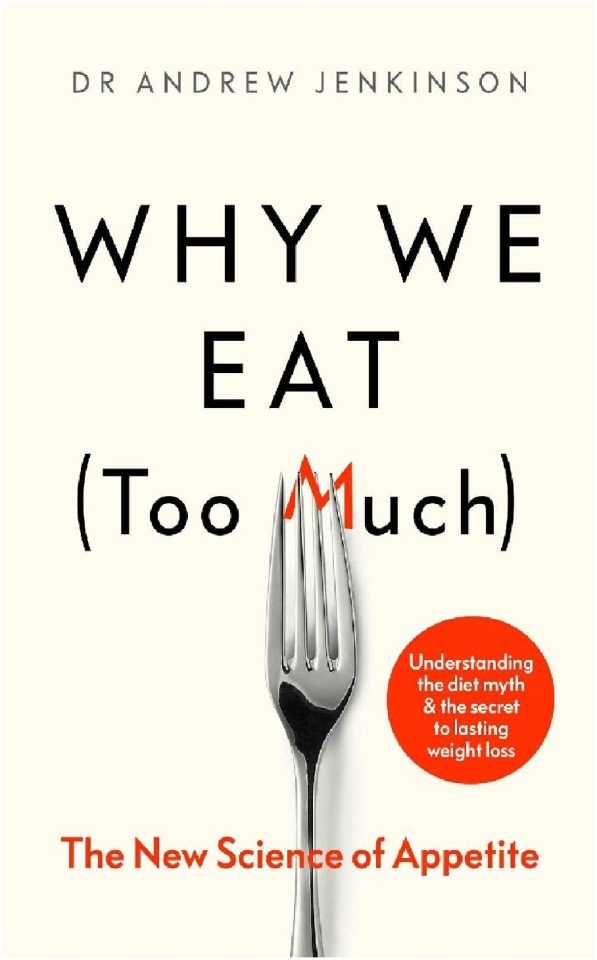
Starting with Why We Eat, you would think it's gonna be judgemental but it's not the case. Dr Jenkinson is a consultant in bariatric surgery, an invasive procedure that cuts the size of the stomach in order to decrease the appetite (by decreasing hunger hormones). But apparently, it's only a short term solution for obesity, because there is a more powerful physiological boss who wins in controlling appetite. The hypothalamus. That's the neuroendocrine gland in your brain. And it has a tight relationship with fat tissue through a messenger called Leptin. All human beings have this hormone that signals to the hypothalamus how much fat (which is a vital source of energy) is stored in the tissues and exerts a negative feedback on it. If there is high level of Leptin (energy fuel tank is full), Hypo keeps you satiated and amps up your metabolism, and vice-versa. So you don't even need to exercise to burn calories. That stands for healthy people. In obese people, there is a huge amount of Leptin but the boss doesn't acknowledge it. It's called Leptin resistance. So to Hypo, there's no Leptin hence feeling ravenous hunger to further fill the tank. That's how hard it is for obese people to stop eating. They don't have a choice. How did they get obese in the first place, you say? Genetics mostly, then environment, then Western food (you'll need to read to know more).
Where does this Leptin-Hypothalamus dysfonction comes from? Two things: High insulin level in the blood by eating high-sugar foods and TNF-alpha, an inflammatory substance made by immune cells as a result of fat tissue cells getting bigger with stored energy, which has effects on vessels (heart disease), articulations (arthritis), cells (cancer) and, you guessed it, the hypothalamus while neutralising the effect of insulin thus creating more of it, which perpetuates fat tissue formation.
So, how can we solve this? First, no dieting. The human body evolution process made sure that it stays alive, so in period of shortage or famine through time, the hypothalamus elevates its equilibrium level (called weight set-point) so that the human being eats more, stores more energy and prevents future energy depletion. Dieting emulates a famine-like state to the brain. You surely lose weight for a few months but you gain more of it when the boss wins over, even more than the pre-diet weight. So, no harsh restriction of food, but minding what kind of food you're eating. For Dr. Jenkinson, the only thing you need to decrease is refined suga, not cholesterol (studies on how cholesterol is dangerous for the heart were biased and funded by sugar companies), to try to get rid of wheat, nuts and vegetal oils because they're rich in Omega-6 which is not the omega we need. Omega-3 is the one we need the most. We can get it from vegetables, meats, eggs and dairy products from grass-fed cows, lambs and chicken, and sea based fish. So it's not about how much you eat, but what kind.
At the end of the book, he gives a few steps to help you regain your normal weight-set point regarding food, exercise, sleep and stress management while also managing your expectations on how quick and drastic your weight loss will be.
It's a well written book. A tad long, but interesting to read.


Andrew insists throughout the book on how important home cooking is. How it's a community driven activity since the discovery of fire. And in order to commit on your weight equilibrium journey, you need to enjoy the process, and cooking yourself is one of those pleasures. For cooking newbies like me, cook books are a must. Not just any books, but the relatable, cut-to-the-chase, no-bullshit, easy-to-follow ones. I discovered one of these and it's a gem.
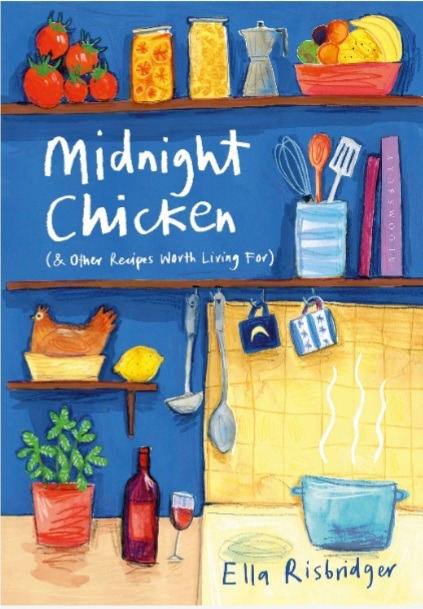
Ella is a funny one. And this is an unusual cook book that you can read just for leisure time. Being a cooking-for-dummies kind of book is a bonus.
And the thing that makes this book special is how cooking was sort of salvation for Ella going through her bad bouts of depression. Having anxiety, i got how she felt and i understood how helpful this book would be to a lot of lost people. First, she gives a brief list on what utensils and staples you need in your kitchen, with no fuss. Then she gives some recipes relating to times of her life and mental health moments.
I have to admit that not all her recipes were for me, but i enjoyed every little bit of sunshine she threw in them. They're written like essays, not like your usual cookie-cutter books, so it makes them easy and lovely to grasp. A beautiful heartwarming book.
#ella risbridger#midnight chicken#midnight#cook book#why we eat (too much)#obesity#bariatricjourney#weight loss#diet culture#book review#must read#bookstagram#booklr#books#bookish#must reads#bookworm#booktube#non fiction#mental health#depression#anxiety#social anxiety#feel good#self help books#self care#life hacks#life hack#cookbook
5 notes
·
View notes
Text
my life has been one big drawn out joke recently. here are some topics i will be covering in my budding career as a stand up comedian:
1. my manager’s poorly disguised cocaine addiction and every other fucking thing about him. could go on for ages about this man.
2. the old man who complained about everything from the clothing section to the price of a ps4 controller to the lack of public restrooms (disregarding the multiple signs around the store saying there are no public restrooms). he later complained about again not being able to use the restroom despite being a paying customer. he proceeded to dig in our trash can, pull out my coworker’s used coffee cup, dump the remaining liquid back into the trash can, look me dead in the eyes, and, in an attempt to guilt me a third time into letting him use our restroom, told me he had to pee in this coffee cup because, despite him being a paying customer, i wouldn’t let him use our restroom. i told him okay and walked away.
3. dressing up as velma for halloween was cute and fun and i got to find out which of my regulars wish to know me carnally, but just as velma. one of these guys told me quietly that he always thought velma was the sexy one. he was rather embarrassed to tell me this, hinting at his deep shame. the other? well he came in the next day and asked me, rather demandingly, where the wig was. told me i should get that haircut, or at least wear the wig more often. that his daughter had that haircut. [insert nervous laughter]. mike, andrew, please, you’re making me blush.
3a. on that note, let’s talk about john, who thought, first of all, that he was even in my league. absolutely not. secondly, this 49 year old man thought - no, assumed - we were near the same age. i’m 27 and rather babyfaced but in this time of covid, faces are a hard thing to come by. i’m assuming he assumed i was 50-ish because of the dark circles around my eyes, as all he could see of me was my eyes due to the mask and baseball cap i was wearing that night. he was going to ask me to dinner, but when i told him my age, realized i was “probably” too young for him. this caused me to have an existential crisis, by the way, and now i’m obsessed with under-eye masks and creams. next time he came in, he inquired about my age again. “oh, that’s the same age as my daughter”. so now that’s two customers who want me to stand in as their sexy daughter. that’s fun for me! the third time he came in, i hid out in the back and he asked my coworkers about me. coworker one told him i didn’t have a name. coworker two told him she couldn’t give out employee information. the fourth time he came in was the same night i was worried we were going to get murdered by a (different) regular who had lost his mind, and upon seeing john in my store again, hopefully looking around for me, i was hoping that other guy would come and shoot me down. rather be dead than accused of looking like i was 50 again.
4. recently deciding to treat myself by consuming 20mg of thc and watching buzzfeed unsolved in a paralyzed state for 4 hours. i cried about how sad and lonely ghosts must be.
5. the little girls who were so convinced i was a legitimate witch and had full on meltdowns in the store, forcing their parents to stop shopping and leave, because their little girls were inconsolable in the presence of me, a 27 year old in some black velvet pants. again. the dark circles.
6. learning, on four different occasions, that i definitely look/dress/act like i sell dildos, butt plugs, nipple clamps, and other sexual adult paraphernalia. a lot to unpack here. literally left me speechless when my coworker told me this. i couldn’t even respond to his “i’ve been to lots of sex shops and you look like every girl who works there” comment. i should have been able to. such low hanging fruit. but i just sat there with my mouth open, trying to figure out exactly what about me gives off that vibe.
6a. realizing i tell people i work at a toy store means one thing to me and another to everyone else, apparently.
7. "third base is you telling me about your girlfriend” and all other bro-ista related shenanigans.
8. rapid-fire bit about various miscellaneous customers:
8a. the guy who decided it was appropriate to have an entire conversation about my incredibly average belt. dude. bro. i know my pussy is popping. don’t look at my crotch while you’re talking to me about my crotch.
8b. a very stable man pretending to hold up the store with a nerf gun and then singing grandson’s “oh no” to me while making uncomfortable eye contact (still cradling the nerf gun of course)
8c. the cop-hating neo-nazi who rescued a yorkshire terrier which he now carries around in a little pink dress. he didn’t know what a yorkshire terrier was. apparently doesn’t know what cops and/or nazis are. we call him meth-head gun kelly because he looks like machine gun kelly on an intense downward spiral. also his last name is kelly. i don’t know the joke wrote itself.
8d. the teenage boy who stuck his whole hand up his girlfriend’s coochie in the middle of the store, got a real big teenaged boner about it, and shopped around like this was normal and okay.
8e. the stupid dumb idiot regular to called in a bogus mass shooting threat without blocking his number and caused me to have a drawn out anxiety attack for at least 6 hours only to come in the very next night and act like nothing happened.
9. having arthritis in my back at age TWENTY-SEVEN FOR FUCKS SAKE MAN
10. “oh my asshole!” “if i have to see someone’s toes they better be immaculate. i better be able to suck on those toes” “people fuck dead bodies in this game” and every other asinine thing my coworker says to me on a regular basis.
11. and of course, my dad just straight up losing his god damn mind. hiding quarters in trees just to see if anyone notices. hunting snails late at night. choosing to spend upwards of $30,000 on home repairs because he’s going stir crazy. just. every single thing about my dad.
12 notes
·
View notes
Text
Chelsea Scolt and Andrew Scolt
Chelsea and her brother Andrew share deep connections and powerful attachment as siblings. At 3, Andrew was diagnosed with Autism. This is the age when most children with special needs get diagnosed due to late milestone development.
Andrew is now a gentle and courageous 21 year old. "He is non-verbal and the most beautiful being I have ever seen- says Chelsea ( Andrew's sister )."
Some days he just whangs the cup of his tea on the floor, sometimes he opens the door of the refrigerator and slams it repeatedly and other days he bangs his legs on the floor so hard that plights to arthritis in his knees. His mood takes different shades anyday.
" Many times I end up with scratches all over my arms- says beautiful and caring sister of Andrew."
However these actions are triggered by sight, sound and smell around him in the environment. Andrew is like a precious existence for his sister who keeps catering love and care unconditionally to him. Andrew has meltdowns due to inability to cope with surrounding and partly our inadequacy as a society to create a holistic and friendly environment that is conducive to their needs. Despite all the hurdles, our courageous Andrew vibrates that spark of positive vibes and fights out all the odds. Andrew and Chelsea are enough for each other. The presence of such beautiful connections in the challenging phase disappears all the pain and gives you strength to fight the battles.
Andrew's sister has a message for all those families who are fighting silent battles:
To all the Angels out there who are standing strong with the small kids or people of any age who require special affection and care; please don't hide your gems in a closet. Let the world know about them. The challenges that they face, the milestones that they reach, the love that they radiate and the positivity that they bring. Share it with the world. Together let's make the world a better place for them. 💙
PS: April marks the month of Autism awareness and team thee untold would like to give a shoutout to all those who fight this out. And today 10th April marks sibling's bond day!!
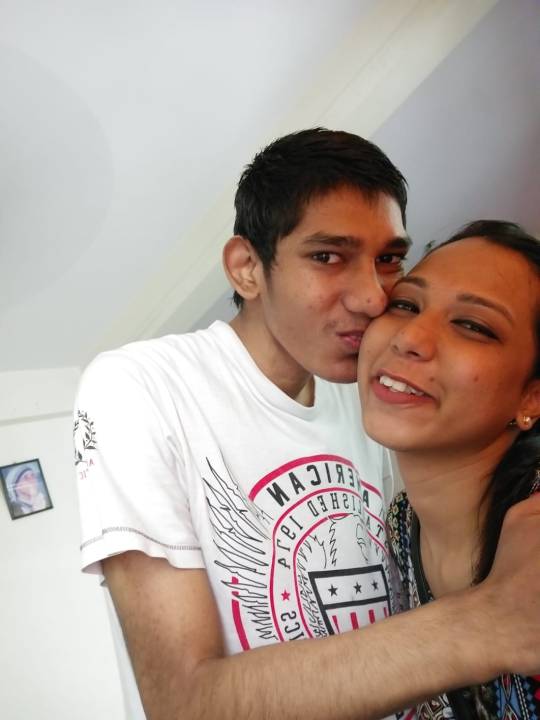
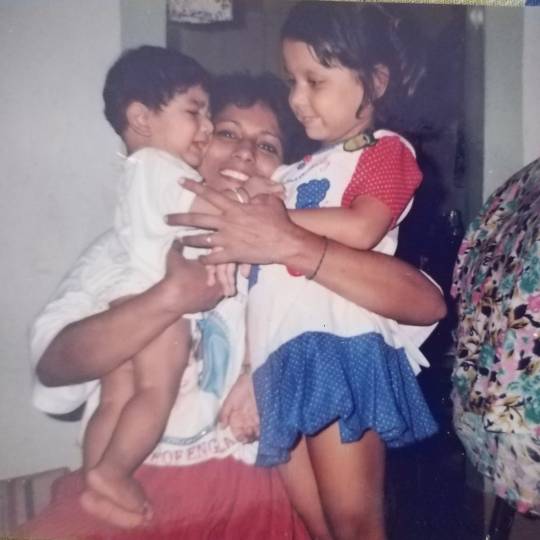
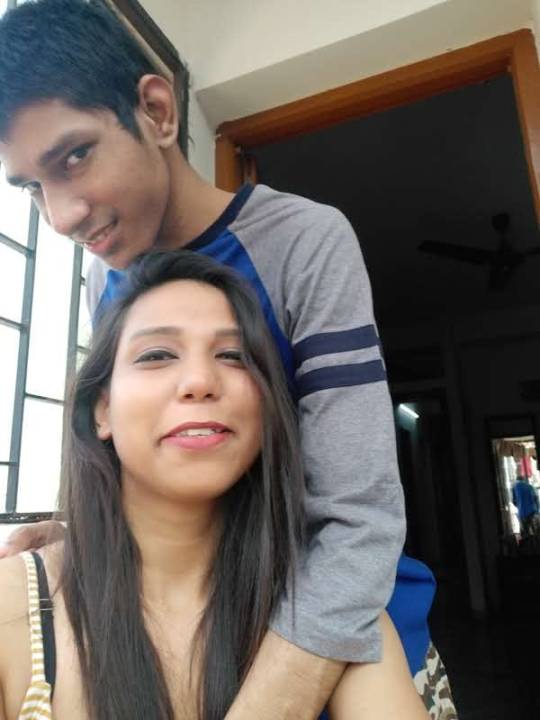
#being human#short story#writers on tumblr#writing#storytelling#real stories#realtalk#siblings#my writing#strentgh#motivation#tumblr#tumblog#live blogging
1 note
·
View note
Text
Assisted suicide ‘is the abandonment of care’
By Scott Benton MP
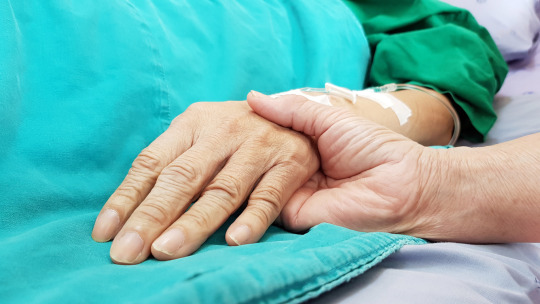
Recent calls for a parliamentary review of assisted suicide prematurely presume that the winds of political and social change are blowing in favour of legalisation.
Through heavy focus on hard cases and hardly any coverage of the life-giving merits of palliative care, some proponents of change in Parliament have grandly overstated the problems with the status quo and grossly overestimated the successes of assisted suicide legislation elsewhere.
As the most recent government response to a parliamentary urgent question on foreign travel for assisted suicide demonstrates, their demands are far from measured in their misleading comparisons and claims.
And as the most recent government reply to a written question on a future review of the law around assisted suicide suggests, those advocating for assisted suicide have far from full support in Westminster and Whitehall.
Addressing the secretary of state for health and social care Matt Hancock, Andrew Mitchell suggested that the ‘suffering that the blanket ban on assisted dying is causing dying people and their families […] [and] the challenges that the current law is creating for healthcare professionals, police officers and other public servants...’ would be alleviated by a ‘very tight reform’, effectively resembling the system of assisted suicide available in the American state of Oregon, with the addition of ‘suicide courts’ to pass judgement on who should live or die.
Assisted suicide advocates place the Pacific Northwestern state on a pedestal, claiming it has robust regulation and successful safeguards that prove assisted suicide laws work.
Yet they conveniently ignore the ways in which the Oregon Death with Dignity Act has been bent and broken since 1997. The rate has skyrocketed by over 1000% from 1998 to 2019, and while almost half of all patients in that period have cited concern about being or becoming a burden on family, friends, and caregivers among their end-of-life worries, only around a quarter were concerned by inadequate pain control.
As in the handful of other jurisdictions that have legalised assisted suicide, less than six per cent of countries worldwide, access continues to expand. In Oregon, it is now possible to have your life ended on the basis of ‘terminal’ conditions such as arthritis, diabetes, and complications following a fall.
Any proposal that the UK can engineer an Oregon-plus system of assisted suicide with even tighter safeguards ignores that only four per cent of Oregon patients since 1998 have been referred for psychiatric evaluation and almost the same number have suffered complications.
Furthermore, complications are only reported when the physician or alternate health care provider is present at the time of death, which has not been the case for 60.5% of deaths since 1998.
Most strikingly, the Oregon Health Authority is concerned by the growing number of suicides across all age groups yet unconcerned by the vast increase in assisted suicides over the past two decades. Indeed, a study of suicide rates across the American states that have legalised assisted suicide illustrates that legalisation is associated with an increase in the total suicide rate.
While advocacy for assisted suicide claims strong public support, as Christine Jardine suggested during the latest debate, the polling of public support for assisted suicide is hindered by simplistic questions.
When more precise issues are presented to the public, the results are more complicated. This was certainly the case in a February 2019 survey when 51% responded that they would be concerned that the legalisation of assisted suicide might cause some people to feel pressurised into accepting lethal medication to avoid burdening others.
Other arguments for legalising assisted suicide centre on the present danger of prosecution. Though these claims summon strong emotions around perceived injustice, they misrepresent the reality.
Only three cases of possible assistance or encouragement of suicide in England and Wales have resulted in prosecutions since 2009. Prosecution is rare, and serves as an essential safeguard against abuse and exploitation of some of the most vulnerable in our society.
The merits of palliative care seldom feature in petitions for assisted suicide legislation. As Danny Kruger highlighted in his contribution during the recent debate, modern medicine can effectively alleviate distressing symptoms associated with the dying process.
Rather than sidelining such services as a separate issue, proponents of assisted suicide should instead demand universal access to high-quality palliative care. Notably, 90% of palliative care specialists opposed legalising assisted suicide in the form of the 2015 Marris assisted suicide bill.
A recent British Medical Association members’ survey found that 76% of palliative care specialists - those who have the most expertise and experience in caring for the terminally ill at the end of life - oppose any legalisation of assisted suicide, and the same percentage declared that they would be unwilling to participate in any such activity.
The terminally ill deserve the best palliative care available. Vulnerable patients who experience suicidal ideation should receive high-quality physical and psychological care that reaffirms their inherent dignity, rather than medical confirmation, here or abroad, of their diminished view of their own life.
Matt Hancock himself stated that ‘[t]he global devastation of the coronavirus pandemic has brought to the fore the importance of high-quality palliative care’. Indeed, as the Department of Health and Social Care continues to battle the Covid-19 crisis, it is my hope that investment in hospice care remains high on the agenda.
Certainly, the government must respond to the recent survey from Hospice UK which shows an overwhelming 93% of hospice leaders were concerned that their patients with end of life and palliative care needs could miss essential treatment because of stretched resources.
As Fiona Bruce powerfully argued in the Chamber, ‘when the whole country is making huge sacrifices to protect life, at a time of exceptionally high levels of physical and mental stress, and when many people may feel very vulnerable [...] it would be completely inappropriate—indeed, insensitive—of this Parliament to go anywhere near considering making access to any form of suicide easier’.
Far too many of our citizens have experienced unprecedented loneliness, uncertainty, and change during this often paralysing pandemic, and introducing assisted suicide would be far too rash a response.
Thankfully, the government has resisted the latest round of pressure from assisted suicide advocates. They are not alone in standing firm against an unnecessary and unsafe proposal: Perhaps tellingly, not a single doctors group or major disability rights organisation in the UK supports changing the law, including the British Medical Association, the Royal College of General Practitioners, the Royal College of Physicians, the British Geriatric Society, the Association for Palliative Medicine, Disability Rights UK, SCOPE, United Kingdom’s Disabled People’s Council, and others.
Laws send social messages. An assisted dying law, however well intended, would alter society’s attitude towards the elderly, seriously ill, and disabled, suggesting that assisted dying is an option they ‘ought’ to consider.
2 notes
·
View notes